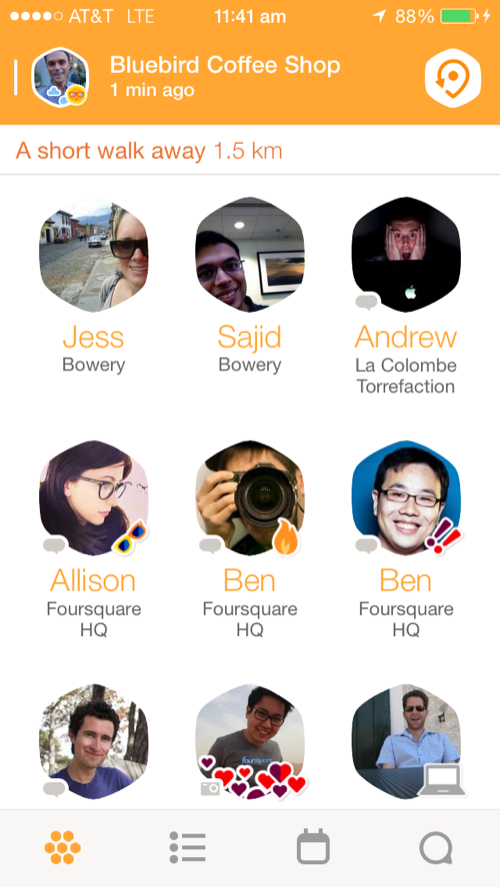The first thing I did after downloading Foursquare’s new Swarm app was drastically cull my friends list on Foursquare from over 100 people down to just 19.
When I joined Foursquare a few years ago, I was living in Arizona, still in college—a completely different lifestyle. As the years went by, things changed but my friends list kept growing. I stopped using Foursquare for checking in, and started using it as a location recommendation service, similar to Yelp. In my mind, it wasn’t really a social network anymore—in fact, I started keeping it among the travel apps on my iPhone.
This is the concept Foursquare wants to build: to move beyond the check-in. The company’s recent unbundling of its services yielded two separate entities—Swarm, the social network; and Foursquare, the app you’ll use when trying to figure out what to do next.
Foursquare isn’t the first social network to experiment with splitting up its services. Facebook, most notably, has been trying to unbundle itself for years, sometimes failing along the way. Its latest move—forcing Facebook users into Messenger if they want to chat on mobile devices—was largely criticized, for example.
Foursquare is also taking a risk by dividing its efforts for two distinctly different services seemingly working in opposite directions. Yes, Foursquare’s location discovery application will use your check-in data from Swarm, but Swarm also wants to create a different social experience entirely.
Swarm—Creepy Or Convenient?

Swarm was Foursquare’s way of ripping the check-in from its flagship app. The new social app uses your phone’s GPS function to broadcast where you are at all times, and view others’ locations, too.
Named after the Foursquare “Swarm Badge” that signifies a busy location, Swarm is the latest “ambient location” app to launch this year. “Ambient location” apps rely on mobile phones’ location services to display your general area to your friends in a passive way, without the need to check into any specific location. That’s how Swarm works.
If you decide you want to share your exact location with friends, Swarm’s check-in feature is basically the same, but now you can also share your future plans with friends and invite them to join in. Ambient location sharing can be turned off, but it’s on by default.
I’m skeptical of location sharing in general. I rarely check into places until I’m ready to leave, and even then, I don’t see the benefit. And with Swarm, my general location is visible to anyone at any time. There are only a handful of people I’d be okay with knowing that information, and it’s not anyone on the friends list I’d amassed since joining Foursquare four years ago.
I’m probably not alone here. Ambient location apps haven’t taken off, and even Facebook’s attempt to get friends to share their general locations has fallen flat. Most people don’t mind telling their friends where they are, as long as they’re okay with those friends joining them. I bet most people don’t have 100 or more friends they’d enjoy meeting up with randomly on the street.
Foursquare doesn’t disclose monthly active user numbers, but the company boasts over 50 million app downloads. Still, one would imagine users stay in contact with friends over Twitter and Facebook more often than they do with Foursquare, and moving check-ins to Swarm may not help Foursquare in that regard.
Reserve Your Tickets Now: Join ReadWrite And Foursquare’s Dennis Crowley To Talk About The Future Of Apps
Foursquare is simply not as popular as Facebook, Twitter, or Instagram, even though the company is technically in the same category as those companies. In 2010, Foursquare CEO Dennis Crowley was even dubbed “The New King Of Social Media”—but four years later, Foursquare may be doing more rebuilding than refining.
Swarm, Foursquare’s new social arm, will more or less need to build its community from the ground up; Crowley says the company is building tools to make it easier to bounce between Foursquare’s apps, but I doubt users like me, who primarily use Foursquare as a recommendation tool, will find Swarm appealing.
A New Direction For Foursquare
As Swarm tries to popularize proximity apps, Foursquare will have its own hurdles to jump.
The new Foursquare app to be released later this year will offer suggestions on where to go and what to order, based on users’ unique location histories. On the plus side, Foursquare’s directory of places consists of over six billion check-ins, which is more than any other service—arguably enviable by Google or Yelp.
See Also: Foursquare CEO: How We’ll Tell You Where To Eat And What To Order
Foursquare will learn your behavior based on your previous check-ins and ambient location data—such as where you like to eat, or when you like to go to the movies—and tailor suggestions for where you should go next. The Foursquare app will eventually deliver push notifications when you are at a new location, and serve up suggestions for what to do there.
Many places have “tips,” or small reviews written by Foursquare after they check in. Unlike Yelp, these Foursquare reviews tend to be short and concise. As Foursquare moves away from the check-in, these reviews will be the focal point of the new application.
The only way for Foursquare to collect your location data once check-ins are removed is to use location services running in the background to track where you’ve been, which is concerning for privacy-conscious folks. In order to receive tailored push notifications, you’ll have to let Foursquare track you.
Foursquare’s collection of places is likely robust enough on its own to succeed as a competitor to Yelp. But will users be comfortable giving up their location information to both Foursquare and casual contacts on a regular basis? I’m not convinced.
Lead image via John Fischer on Flickr
















